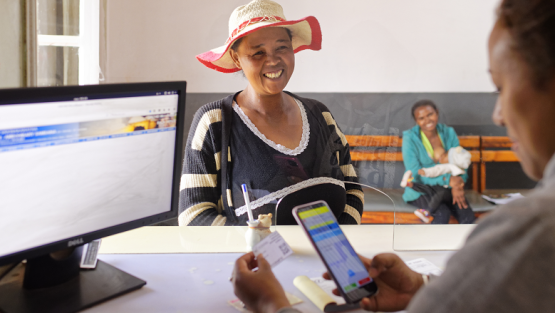Eleanor, a mother of two in the North of Madagascar, has registered her micro-business with the tax department for mobile payments. With this new account, she can receive funds, and pay for goods and services, building a transaction history that could help her if she seeks to obtain a loan.
The World Bank’s Madagascar Financial Inclusion Project shows the potential for digital financial services and Fintech to contribute to economic recovery and drive financial inclusion in the island nation, which has long been exposed to climate change.
Madagascar’s financial sector continues to expand, but financial inclusion remains low.
Over 30 financial institutions make up the sector, including banks, microfinance institutions (MFIs), and e-money institutions. Mobile Money adoption grew considerably between 2017 and 2020, from 277 accounts to 645 per 1,000 adults. The value of transactions as a share of GDP rose to 47% from 12% in the same period.
Even so, only 18% of Malagasy adults accessed formal financial services in 2017, with gaps between men and women as well as urban and rural areas.
This potential has been demonstrated globally, including in East Africa, through mobile money and digital credit, which largely benefit the poor.
Access to quality Internet technology (4G/5G, broadband), electricity (only 33% have access), and related costs constrain Fintech and digital financial services adoption. There are other limitations, too: 63% of the country’s population lives in rural areas with higher poverty rates, and a quarter lacks formal ID.
Digital financial services could accelerate economic recovery and inclusion in Madagascar
These opportunities have been extremely valuable amid the pandemic.
Telcos in Madagascar are licensed to provide e-money services, and over 10 million people have opened accounts. Other non-banks also participate in digital financial services offerings, such as the Post, which helps distribute payments in response to the pandemic thanks to its large network of access points.
Microfinance Institution clients can apply for loans and build credit records to improve their creditworthiness. MFIs distributed 448,000 micro loans to micro or small firms, which helped build resilience.
With support from the World Bank’s Madagascar Financial Inclusion Project, the
The pandemic, with its barrier measures and lockdowns, has accelerated the development of several e-commerce platforms in Madagascar, such as e-sakafo, MyTsena.mg and Mbike Express Delivery.
The foundations of a favorable legal framework for the development of fintech start-ups are in place. New regulations are underway to ensure that “know-your-customer” procedures are proportionate to risk and not unnecessarily burdensome. Anti-corruption and anti-financial crime guidelines already apply to fintech players.
Local fintech players have formed an association and have had discussions with the Banky Foibeny Madagasikara to learn about the regulatory requirements applicable to financial service providers, raise awareness of their activities, and to help inform the evolving regulatory framework relevant to Fintech.
Drawing on the Bali Fintech Agenda and the BIS Policy responses to fintech we suggest five approaches to accelerate the development of Fintech and digital financial services in Madagascar:
- Adapt the necessary regulatory and policy framework: An enabling legal framework can be fashioned by having clear and predictable rules that accommodate technological change while supporting trust and reliability in financial (including climate friendly) products and services. It must create a level playing field that promotes innovation, consumer choice, and access to high quality financial services, regardless of type of market participant or technology.
- Adopt digital identification to ease access to financial services. In a context where most adults still lack formal identification, it will be essential to ensure each Malagasy citizen is able to easily register for formal services.
- Provide market incentives to boost access to fintech services: For example, fintech business model competitions, de-risking mechanisms and support to innovation labs and incubators. Support will be particularly needed for women-led start-ups for skills, financing, and market entry.
- Build the pillars of an inclusive digital economy. As shown through the World Bank DE4A initiative, improved digital connectivity can only achieve the desired transformational impact on economic opportunity and inclusive growth if combined with improved access to digital payments and other financial services, as well as digital support to start-ups and existing businesses.
- Establish a robust and innovative credit infrastructure to promote safe digital credit and ensure that disclosure requirements suited to new digital financial products and providers are in place to protect clients.
Finally,
Credit: Source link





















